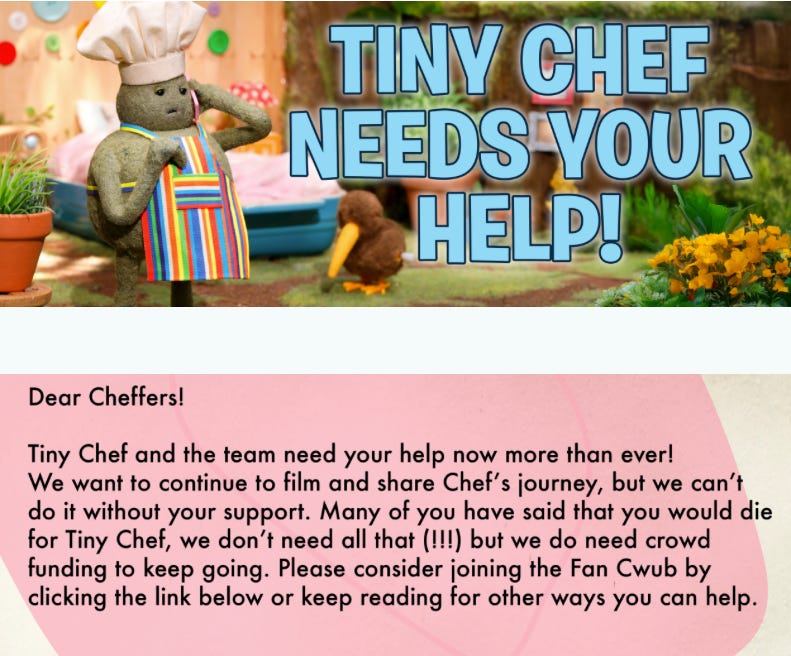Tiny Chef broke the internet. Unless you’ve been living under a rock, you’ll have seen Tiny Chef’s viral cancellation video which landed last week. Even my brother brought it up with me, and he has zero professional connection to kids media. Check it out below; make sure to watch through to the gut punch ending:
Tiny Chef emerged from Instagram and YouTube in 2018. The IP organically gained momentum before partnering up with Imagine Kids & Family. By 2020 a long-form format had been greenlit at Nickelodeon. This launched in 2022 and ran for three seasons, winning multiple Annie and Family Emmy Awards. Despite this success, poor Tiny Chef got the call we all dread. Cancelled. Collateral damage of the merger between Paramount Global, which owns Nick, and Skydance, with greenlight decisions languishing on hold.
The Tiny Chef Show’s co-creator Rachel Larsen described how things ended with Nickelodeon in The Wrap:
“They had really good intentions with the show, and I think it was bad timing with the merger and a lot of stuff that’s happening in the industry. They let us know that this wasn’t going to continue a month and a half ago. At least the cancellation allowed us to do something like this on social media, where we can control our fate. It was bittersweet. Chef made a lot of friends at Nickelodeon. There’s no ill will there.”
Faced with a crummy situation, the showrunners engaged true creator energy, which isn’t surprising given the show’s origins. They broke the fourth wall, owned the narrative, and delivered a masterclass in the emotive storytelling potential of animation. The clip certainly sums up the mood of the industry right now, with cancellations, lay-offs and liquidations happening weekly.
So what might be next for Tiny Chef? The social media and PR machine is very much in motion, in addition to The Wrap there was great coverage in Vulture, and even Good Morning America. Plus he went global featuring in El Pais ( “¡Pero ganamos un Emmy!”) and the Shameless podcast. Cheffy also has no shortage of celebrity friends. Florence Pugh, Melissa McCarthy and Dionne Warwick have come out voicing support. Kristen Bell, Ron Howard and Brian Glazer were all part of the production team and there were many high-profile guest stars on the Nickelodeon show.
The team at the helm are currently focused on crowdfunding. This is where the majority of comms is pushing at the moment. You can join Tiny Chef’s Fan Cwub for as little as $2 per month. The good news for Cheffers is that they’ve met their first internal fundraising target, a reported $120k. There is also a fan petition at change.org with over 10k signatures.
In addition to this, there is a limited amount of products available on the Tiny Chef online shop. Plushies are being restocked but are available to preorder. After that it’s simple stickers, totes, mugs and print on demand stuff.
Looking further, branded content production could be a significant revenue driver for a show like this. And brands are calling. Greggs, in fact. This is not the first time I’ve professionally needed to explain Greggs for folks outside of the UK.
Greggs is a British bakery specializing in sweet and savory convenience snacks. Sounds random, but they’ve got presence on practically every high street in the UK. They like to play it cheeky on social media too. So although they’re not global or US, this could be an excellent first get for Tiny Chef. A highly popular UK brand who aren’t afraid to push the envelope. They’d certainly have the cash. Here’s hoping that this was a meaningful offer and not a brand vapidly piggybacking on virality.
There’s one more thing Tiny Chef has in his apron pocket right now and that’s everything-everywhere distribution. The first season of The Tiny Chef Show hit Netflix US at the end of last year. That broadens long-form access and distribution in his home market. YouTube is the most important platform for kids, but premium streaming gives credibility, and more crucially, a place parents are happier for their young kids to be. That means in the US Tiny Chef is currently covered on Nick, Netflix, YouTube and socials.
The Nick-Netflix relationship is an interesting one. A mellowing in content exclusivity is definitely observable. Shows that called Nick Jr. home for many years, like Peppa Pig and PAW Patrol, have recently managed to get windows on Netflix. Even the latest SpongeBob movies premiered on Netflix instead of Paramount+.
The other thing we see through the Netflix Kids Content Performance Report is that the “Cobra Kai effect” is observable with some kids shows. That’s when a show gets cancelled on one platform and then finds success on another (Cobra Kai was cancelled by YouTube before thriving on Netflix). Could The Tiny Chef Show see some of this action on Netflix? The viral cancellation activity is sure to have helped, plus the show is genuinely adorable and will doubtlessly compound audiences wherever it goes if it can be discovered.
So what’s the strategic way forward for Tiny Chef? Double down on the crowdfunding and online shop? Yes. But go further, really explore content partnerships and seriously consider pushing your US audience to Netflix, where the show may end up in the long term. Then sell this excellent content footprint to stakeholders: investors, would-be commissioners, acquirers, and licensees.
Tiny Chef is the perfect example of new-era IP. Built from the ground up on digital platforms, then taking a successful detour through legacy media before returning to his roots. If he can break the internet, imagine what else is possible. Creator instincts to the power of franchise planning is an excellent equation for any media brand hoping to build in today’s landscape.






Great article, here’s hoping we get to see more of Tiny Chef soon!